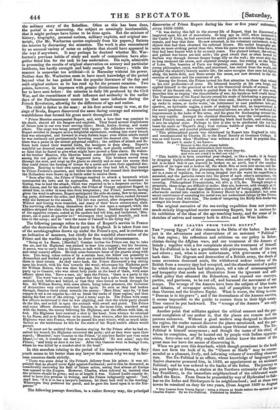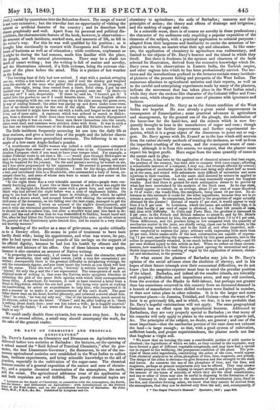DRY LEAVES FROM YOUNG_ EGYPT. * TEE "young Egypt" of this
volume is the Delta of the Indus. Its sub- ject is the adventures and observations of an assistant " Political" in that region ; his reflections and criticism on our policy in Beloo- chistan daring the Affghan wars, and our treatment of the Ameers of Scinde ; together with a few complaints about the treatment of himself. The Ex-Political is in fact a gentleman with grievances, both of his own and others ; and, what is more unfortunate, with grievances of a long back date. The disgrace and destruction of a British army, the death of some seventeen thousand souls, the withdrawal nolens volens of the British from a country tjey had occupied, and the abandonment of a policy for which that occupation had taken place, tell a tale of mismanagement and incapacity that needs not illustration from the ignorant and self- willed policy that alienated the Beloochees, and exposed our convoys, parties, and garrisons, to be cut off, and harassed the movement of our troops. The wrongs of the Ameers have been the subject of blue books and debates, of newspaper articles, and of pamphlets by no less men than Outram and the brothers Napier. What is worse, the thing is over. "Duncan is in his grave"; and if the descendants of the Ameers survive, it seems impossible to the public to restore them to their high estate. Time cannot be put backward. The " wrongs of the Ameers " are only matter of history. Another point that militates against the critical censure and the per- sonal complaints of our author is, that the places are remote and the persona unknown. Without a good modern map designed to illustrate the region, the reader cannot discover the places mentioned, and the per- sons have all that puzzle which attends upon Oriental names. The Ex- Political is himself anonymous ; and though the name of his chief, of whom he complains, may be hunted out by people with Indian opporta- nities, forty-nine out of fifty readers will neither know the name of the great man nor have the means of discovering it. When we get over this drawback, which though prominent in the book does not form the bulk of it, the "Glance at Sindh" may be recom- mended as a pleasant, lively, and informing volume of travelling observa- tion. The Ex-Political is an officer, whose knowledge of languages and Native character procured him, in 1839, an appointment as an assistant Political; and he was ordered to the banks of the Indus. The journey to his post begins at Deesa, a station at the Northern extremity of the Boni- bay Presidency, in the immediate neighbourhood of the celebrated waste called the Rana. From Deese he proceeded by way of Hyderabad to Sak- kar on the Indus and Shirkarpore in its neighbourhood ; and at these two towns he remained on duty for two years, (from August 1839 to August • Dry Leaves from Young Egypt : being a Glance at Sinai before the arrival of Sir Charles Napier. By an Ex-Politleal. Published by Madden. 1841,) varied by excursions into the Beloochee desert. The range of travel is not very extensive; but the traveller lost no opportunity of visiting the natural or artificial features of the country ; and he describes both doses graphically and well. Apart from its personal and political dis- quisitions, the characteristic feature of the book, however, is observation— the account of such incidents, marked men, and manners of life, as fell in the writer's way. For this he was well qualified by his position ; as it brought him continually in contact with Europeans and Natives in the hours of business as well as of relaxation; residence, unpleasant as it might be during the bad seasons, made him familiar with the place, the people, and the natural phenomena. There may be a shade too much of smart writing ; but the writing is full of matter and novelty, and the illustrations selected, if a little extreme, bring the extreme cha- racier of the place before the mind. This is a picture of hot weather on the Indus. The burning heat of July had now arrived. I slept with a pankah swinging over me, within a few inches of my nose; and if ever the drowsy god weighed down the eyelids of the man who pulled this pankah, causing its stoppage, I awoke. One night, being thus roused from a short, fitful sleep, I got up and tumbled over a Native servant, who lay on the ground near me. Is there—is there any air?' I said, desperately. If there is,' said he, ' I haven't got it.' I rushed into the garden to see if I could breathe there. Of two English officers who were stopping with me, one was sitting up to his chin among the green corn, by way of cooling himself; the other was pacing up and down under some trees. None of us closed our eyes for the rest of the night. The atmosphere was so thick, one fancied it might have been cut with a knife, and longed to cut and hack it too, out of mere spite. A regiment which was ordered to march to Shikar- pre, from a distance of little more than twenty miles, was utterly disorganized in the two nights it was en route. Some men threw themselves into the canals, others went mad, and numbers were stricken down with fever. It was in such a time that our impolitic treatment of the Brahais and Hill Bilnchis bore fruit."
The little incidents frequently occurring let one into the daily life at these stations, and give a better idea of the people and the inferior classes of Europeans than more generalized accounts. The following is an ex- ample of a low-caste Anglo-Indian's pranks. " A troublesome old Sindhi woman was indeed a mild annoyance compared with the plague that some of our own underlings were to us. Commend me to a drunken European clerk if you want to have your temper tried. For example, a brother Political wrote to me that a Mr. — would pass through Shikirpore on such a day to join his office, and that I was to furnish him with lodging, and any- thing he required for his journey. On the said person's arriving he waited on me, and I was quite prepossessed by his appearance. He seemed to possess manners and address superior to his present situation. I sent for his things, allotted him a tent, and introduced him to a Risalandar, who commanded a body of horse, en- camped close by, and some of whose men were to escort the new corner on his journey the next morning.
"In the night there was a very tolerable amount of noise—people were con- stantly hurrying about. I sent two or three times to ask if there was aught the matter. At daylight the Risalandar came with a grave face, and said that the Saheb who had arrived the night before was a man of unpleasant habits. On going to his tent he bad spent some hours in drinking; after which he sallied forth with a drawn sword, and amused himself with chasing the servants about, until some of the horsemen, on his falling over the tent-ropes, managed to get the sword out of his hand. I wrote an account of the night's divertissement, and sent it with the whimsical gentleman himself to hisilmaster. My friend thought" he should be able to reform him, but after a-month'sAtrial sent him back in de- spair; and the end otit.Was that he was tianSallited taSlikinkr;' bound haisd'and foot, ker helliad bitten the Native treasurer thibrigh the arm; on which occasion the gravity of that functionary quite forsook him, and he roared in a very dismal and moving manner."
In speaking of the author as a man of grievances, we spoke critically as to a literary effect. He seems in point of treatment to have been hardly dealt with ; losing his appointment, and what was worse, its pay-, after he had spent two hundred pounds of his savings on the support of his official dignity, because be had lost his health by climate and the anxieties and labours of his office. One of these labours we may quote, because it also contains an account of Native writing.
" In preparing the vocabulary, I of coarse had to learn the character, which has this peculiarity, that only initial vowels (with a very few exceptions) are written: consequently there is the greatest difficulty in deciphering writings, for only the consonants appear, and you must insert the vowels as you think will best suit the sense. Thus the word beloved,' is written exactly like pare, ' beyond,' for only the p and the r are represented. The consequence of such an elliptical mode of writing is, that even the Natives make egregious blunders in extracting the pith of the queer little epistles with which their correspondents favour them. A. merchant, for instance, is said to have received a letter from a friend in Bajpfitand, whither his son had gone. Not being very quick at making out handwriting, he asked an acquaintance to help him; who interpreted it in such a manner as to make it an announcement of -his son's death. The poor father threw dust on his head, howled piteously, and collected a crowd about him. 'Alas!' he cried, he was my only son.' One of the bystanders, much moved by his distress, asked to see the letter. Pshaw !' said he, after looking at it, there is nothing about death here: your son has taken a wife; be is happily married.' Now,' said the father, I am worse off than ever, for I know not whether to laugh or cry.'"
We could easily double these extracts, but we must stop here. In the event of a second edition, a small map should accompany the work, for the sake of the general reader.



























 Previous page
Previous page